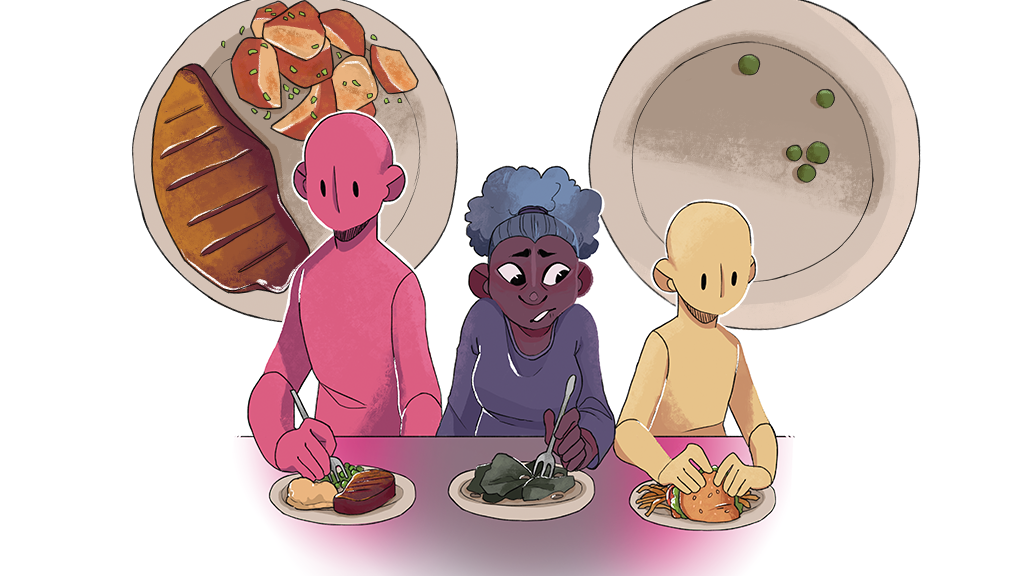A couple of years ago, I dined at a small family restaurant with my father and older brother. My dad is a six foot tall, broad shouldered man and my brother was a military college student dressed in uniform — while I wore short heels and a tea bottom dress. The server arrived with our orders: a salad, chicken alfredo pasta and steak with potatoes. The server picked up the steak and without question passed it to my dad. When my dad explained he had the salad, the waiter then passed the steak to my brother. I informed the waiter that the steak was actually mine. He looked at me, then the steak and back to me again, clearly confused. Only when everyone at the table confirmed that I indeed ordered the steak and potatoes did I receive my meal.
Gender Bias in Food
Gender bias is hardly a new concept. From Equal Work to Equal Pay and the #MeToo movement, gender minorities have worked for equal rights and the dismantlement of the patriarchy for a very long time. However, could food also be susceptible to gender bias? According to Philosophy professor and director of the Women’s and Gender Studies program Silvia Benso, it’s possible.
Food is culture, and everything — especially gender — is affected by culture.
“Food is culture, and everything — especially gender — is affected by culture,” Benso said.
Every culture has a different relationship to food, but American culture perpetuates more of these gender norms. Brenda Ariba Zarhari Abu, a post-doctoral fellow of the Wegmans School of Health and Nutrition, believes that this is linked to Americans' typically unhealthy diet. Even the common high-calorie, high-fat foods like chips and cookies can still be associated with feelings of shame and guilt. This is intensified for women where beauty standards often uphold notions of thinness as beauty. The stereotype that women eat more salads may not always be about nutrition, but sometimes a social performance.
“We associate eating vegetables with looking thin, so we may want to eat more salads to appear this way,” Abu said.
Hayley Howell, a second year student in Diagnostic Medical Sonography, has had this experience. She explained that dining publicly can quickly become an intense social scenario; something as simple as what you order can become a recipe for judgment and shame.
“I think there’s a pressure to eat healthy, to eat a salad and not burgers or shakes, especially if you’re a heavier build,” Howell said.
Stereotyped Marketing
The shame people feel when eating didn’t come from nowhere. The advertising industry is notorious for perpetuating several gender stereotypes. Even food commercials participate in the hypersexualization and objectification of female forms. In 2014, an article posted by the Munchies talked about how food and drink advertisers exploit gender biases to market their products.
“If you are a man, advertisers believe that you like meat cooked on fire, or food that's simple to eat. Or you like yogurt, crumbly chocolate that can only be enjoyed as a 'guilty pleasure,' and anything without calories,” wrote Oscar Rickett in the Munchies.
Advertisements are often expected to be corny and shallow, but they can still have lasting consequences on society. Ads don’t just sell products, but ideas and cultural norms too. A common phrase in marketing, “sex sells,” is almost entirely used in a heteronormative fashion to appeal to the male gaze. For example, the infamous Carl’s Jr and Hardy’s ad, poorly nicknamed “SlutBurger,” is a minute and a half of women in bikinis eating burgers. Unfortunately for women, the common message is that food — even low-calorie items like yogurt — is a “guilty pleasure” that should be indulged in secret. Studies show these narratives are harmful and can feed into a monolithic view of female bodies as well as unattainable, unhealthy goals for women’s diets.
Health Risks
“A lot of times, women try to achieve the so-called ‘perfect body,’ so they think if they eat less or exercise more they can become the ‘perfect woman,’" Grace Lombardi, a first year Computing Science major, said.
This in part is why eating disorders, particularly anorexia and bulimia, are more common in women than men.
A study by the National Eating Disorders organization claimed, “Anorexia is the third most common chronic disease among young people.”
A similar study by the National Institutes of Health stated that about one in five women and almost one in 10 men check their body size “very often.” According to Abu, eating disorders have a lot to do with maturity and young people, particularly teenagers, are more vulnerable to these bad habits.
However, it’s not just eating disorders young people should beware of. Abu says even dieting can cause serious bodily harm. On average, most men need 2,000 calories a day as opposed to most women who need 1,800 calories a day. The problem with dieting is that more often than not, it doesn’t encourage healthier eating habits — only caloric restrictions. Abu said this can lead to “weight cycling,” or the fluctuation of body weight, when people continuously binge eat and diet. Weight cycling not only risks damages to organs and bone structures, but an increase in developing diabetes and certain cancers. At the end of the day, our bodies need consistency.
As Benso said, food and culture are intertwined. Food bias exists because gender bias is still prevalent in our culture for women to conform to beauty standards. However, as culture changes so do those standards. In the future, perhaps gender biases in food will not only decrease, but be nonexistent. Maybe the next time I order my steak and potatoes, it will be placed before me without question or judgment.








